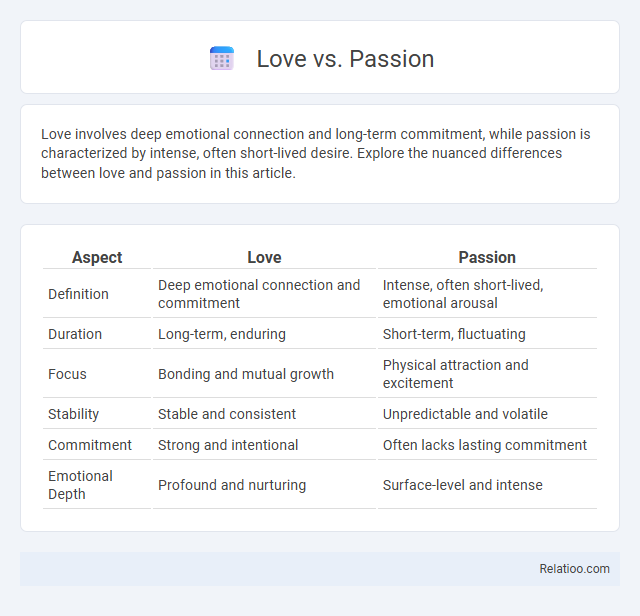Love involves deep emotional connection and long-term commitment, while passion is characterized by intense, often short-lived desire. Explore the nuanced differences between love and passion in this article.
Table of Comparison
| Aspect | Love | Passion |
|---|---|---|
| Definition | Deep emotional connection and commitment | Intense, often short-lived, emotional arousal |
| Duration | Long-term, enduring | Short-term, fluctuating |
| Focus | Bonding and mutual growth | Physical attraction and excitement |
| Stability | Stable and consistent | Unpredictable and volatile |
| Commitment | Strong and intentional | Often lacks lasting commitment |
| Emotional Depth | Profound and nurturing | Surface-level and intense |
Defining Love and Passion
Love is a deep, enduring emotional connection characterized by commitment, trust, and affection, while passion refers to an intense, often fleeting, feeling of desire and excitement. Your understanding of love involves long-term care and mutual respect, whereas passion is driven by physical attraction and heightened emotions. Differentiating these concepts helps you navigate relationships with clarity and emotional intelligence.
The Psychological Roots of Love and Passion
Love and passion stem from distinct psychological roots that influence your emotional experience differently. Love is rooted in attachment theory, fostering deep bonding, trust, and long-term commitment, while passion arises from intense physiological arousal and desire often fueled by dopamine and adrenaline. Understanding these foundations helps you recognize how love supports lasting relationships, whereas passion drives initial attraction and excitement.
Emotional Connections: Depth vs Intensity
Love creates deep emotional connections grounded in trust, commitment, and long-term understanding, fostering stability and growth. Passion drives intense but often fleeting emotions marked by desire and excitement, prioritizing intensity over lasting depth. You can find balance by recognizing that love sustains emotional depth while passion fuels the intensity needed for a lively bond.
Signs of True Love vs Signs of Pure Passion
True love manifests through consistent support, deep emotional connection, and unwavering commitment, while pure passion is characterized by intense physical desire and fleeting excitement. Signs of true love include mutual respect, trust, and patience, whereas passion often involves impulsive actions and overwhelming attraction without long-term stability. You can recognize true love by its enduring nature and genuine care beyond mere physical or emotional intensity.
The Role of Time in Love and Passion
Love deepens and matures over time, evolving into a stable emotional bond marked by trust and commitment. Passion, by contrast, often ignites quickly and may fade or transform as time passes, driven largely by physical attraction and intense emotions. Your understanding of these feelings can grow clearer as you observe how each develops or diminishes through different stages of a relationship.
Impact on Relationships: Stability or Excitement?
Love fosters long-term stability by promoting trust, commitment, and emotional security in relationships. Passion drives excitement and intense attraction, often igniting new connections with heightened desire and energy. Combining love and passion can balance relationship dynamics, sustaining both deep emotional bonds and invigorating excitement over time.
Love and Passion in Long-term Partnerships
Love in long-term partnerships fosters deep emotional connection, trust, and mutual respect, creating a stable foundation that supports growth and resilience through life's challenges. Passion fuels intense desire and excitement but tends to fluctuate, often requiring conscious effort to maintain its energy over time. Balancing love's enduring commitment with passion's invigorating spark ensures Your relationship remains both secure and vibrant.
Can Love and Passion Coexist?
Love and passion often intertwine yet serve distinct emotional roles; love embodies deep, enduring affection and commitment, while passion ignites intense, immediate desire and excitement. Neuroscientific studies reveal that love activates brain regions linked to attachment and long-term bonding, whereas passion stimulates areas associated with reward and motivation. Despite their differences, psychological research confirms that love and passion can coexist harmoniously, sustaining both emotional security and thrilling intensity in healthy relationships.
Navigating Conflicts: Love-driven vs Passion-driven Responses
Navigating conflicts involves distinguishing love-driven responses, which prioritize empathy, understanding, and long-term harmony, from passion-driven reactions that are often intense, impulsive, and emotionally charged. Your ability to manage disputes improves when you recognize that love-based responses foster resolution and growth, whereas passion-driven reactions can escalate tensions. Balancing these dynamics helps maintain healthy relationships and promotes constructive communication.
Building Lasting Bonds: Choosing Between Love and Passion
Building lasting bonds requires understanding the distinct roles of love and passion in relationships. Love provides deep emotional connection, trust, and commitment that sustain long-term partnerships, while passion brings intense excitement and desire but may fade over time. You must balance both elements carefully, recognizing that lasting bonds thrive when passion is nurtured within a foundation of genuine love.

Infographic: Love vs Passion
 relatioo.com
relatioo.com